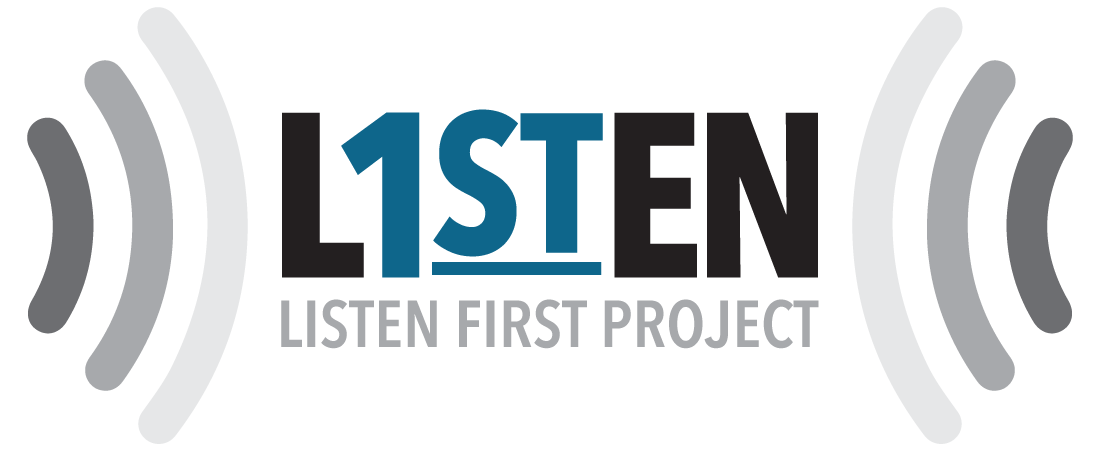In a very simple sense, conversations boil down to speaking and listening. On one side of the equation, you have an individual who is disclosing, sharing, laying bare his soul. When we open up to another, we become vulnerable, trusting that on the other side of the equation is a person who is genuinely trying to understand our perspective. When this ideal is met, not only are conversations more productive but meaningful relationships form. As the theologian Karl Barth once said, “If I give you my time, I give you everything I have, I give you all that I am.” When we take the time to really listen to others, we are helping to build a foundation for a lasting relationship. And it is in relationships that we learn to work together, regardless of divides.
National Conversation Project wants to highlight the power of listening because of what speakers often find on the other side of the conversation equation, an adversary who seems to go to great lengths to tear us down. It has become more than simply disagreeing with opinions, something that effective listeners can do. As an excellent example of this, take the podcast, Conversations With People Who Hate Me.
In Conversations, Dylan Marron records Skype calls with people who have posted hateful messages about him on the Internet. As he explained in a Wired interview, “I wanted to put in the world an example of two people talking, without the goal of agreeing with each other, but also without the goal of shutting each other down.” Indeed, there is not much agreement that happens in the 30-minute episodes of Conversations, especially about policies or social issues. There is, however, quite a bit of opening up, especially about why each person believes what he or she believes.
The kind of change we find in Conversations involves a change of heart, a connection between two people even if they might be divided in their beliefs. In the introduction to episode four, Facts and Feelings, Dylan reminds listeners that “there is a person on the other side of the screen.” What is so amazing about this statement is that the person to whom Dylan was referring was at one point posting inflammatory personal attacks!
To humanize “people who hate me” involves a large dose of empathy, what scholars define as our ability to understand another person’s perspective, their point-of-view. Colloquially, empathy is the ability to walk a mile in another’s shoes – something that is neither literally nor figuratively possible, but something toward which good listeners strive. Good listeners suspend judgment, not to say “I know how you feel” but to ask questions and prompt extended disclosure from the other in order to get the full story. Dylan gets this full story by asking why, the kind of why that is less about “why could you do such a thing” and more about “why do you believe what you believe.”
If empathy is about a genuine curiosity of other people and the reasons behind their beliefs, acceptance is about hearing these reasons as legitimate, at least from that person’s perspective. The power of acceptance comes from being heard on our own terms, in our own language and our unique ways of seeing the world. In episode four, Dylan responds to Ann’s comment that she is nervous by saying, “Don’t be nervous. Just be you. And I’ll be me. And that’s all we can agree to.” In this way, Ann is not forced to be a stereotype or how Dylan wants her to be. Instead, she is free to be her, to open up on her own terms and be heard as a person rather than a position. Ann is accepted and thus able to be herself; and Dylan is interested in that self, to listen to Ann as she is, not as how he wants her to be.
And so the purpose of a Listen First mindset is to connect with others, not on positions per se but on a fundamentally more interpersonal level. If listening is about relationships and relationships begin with connection, then listening to connect is the first skill that NCP tries to foster. Listening to connect is about exhibiting empathy in the form of perspective taking and acceptance of the individual. Indeed, it is much easier for us to agree with a person’s position on himself than we are with his position on some controversial issue.
As Conversations illustrates, the connection we get from listening has little to do with agreement (or even agreeing to disagree). In episode 2, for instance, Dylan did not suddenly realize “being gay is a sin” after his conversation with Josh, and neither did Josh suddenly accept Dylan’s lifestyle. Both did, however, feel more understood, and both had a better understanding of the other. Each also felt accepted for who he was. When based in empathy and acceptance, conversations create powerful connections, something each person can build on if they so desire toward a deeper and more meaningful relationship. These desirable outcomes are only possible if we listen first to understand. So, #ListenFirst.
Graham Bodie, PhD is Chief Listening & Operations Officer at Listen First Project and a recognized listening expert
